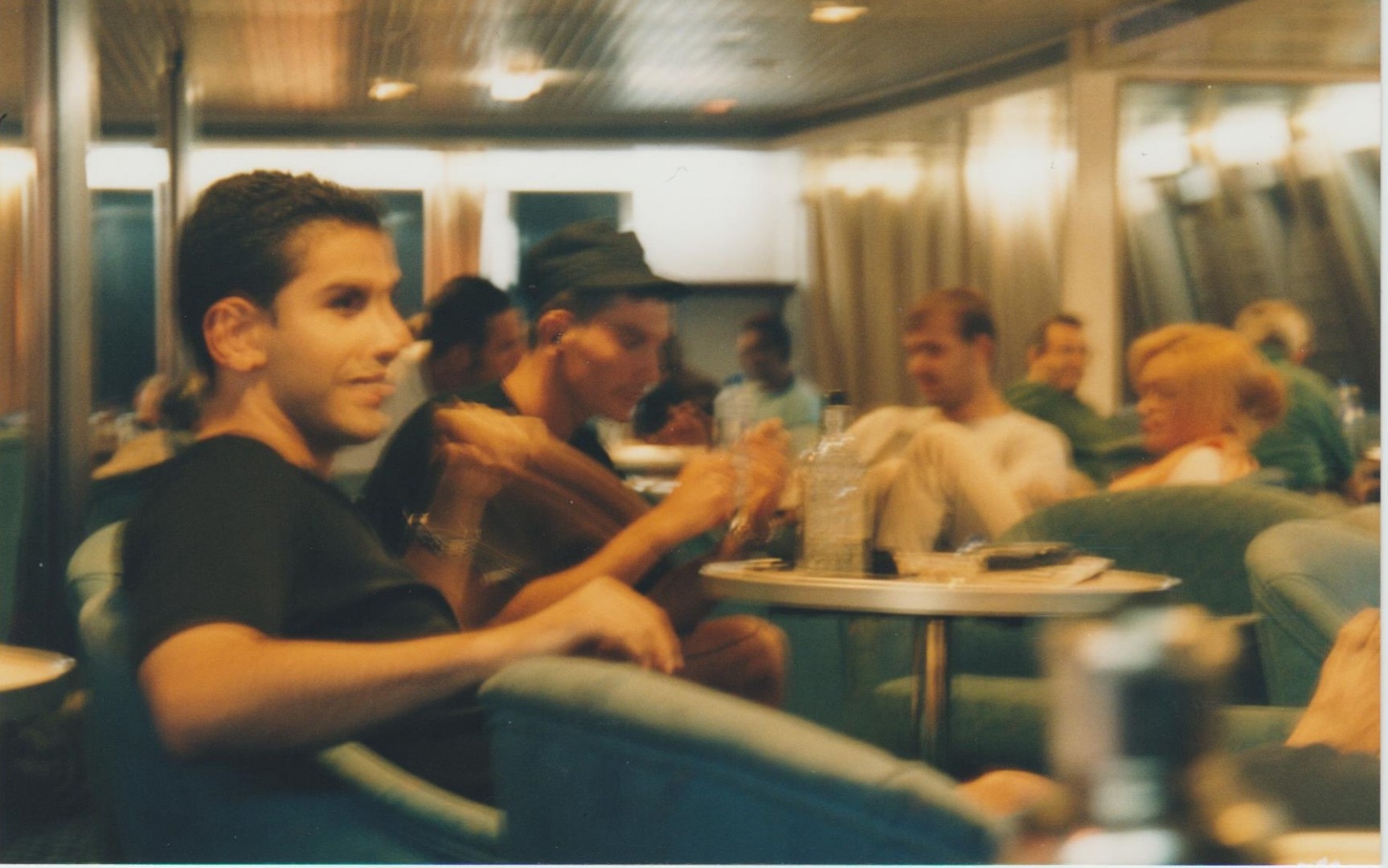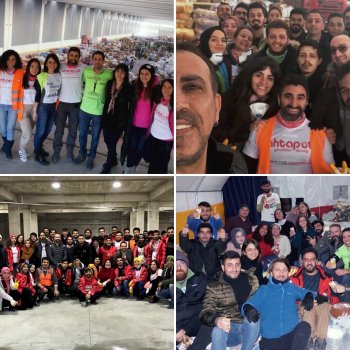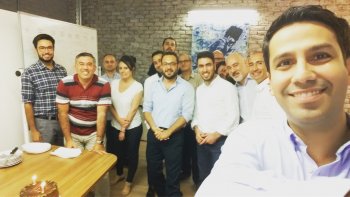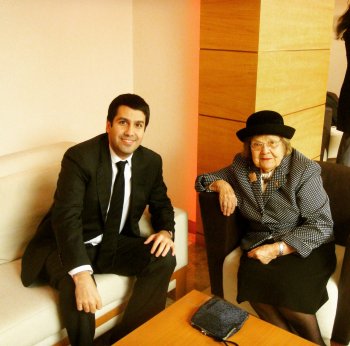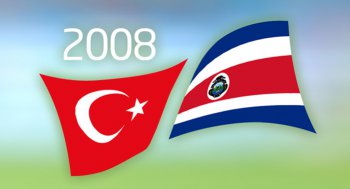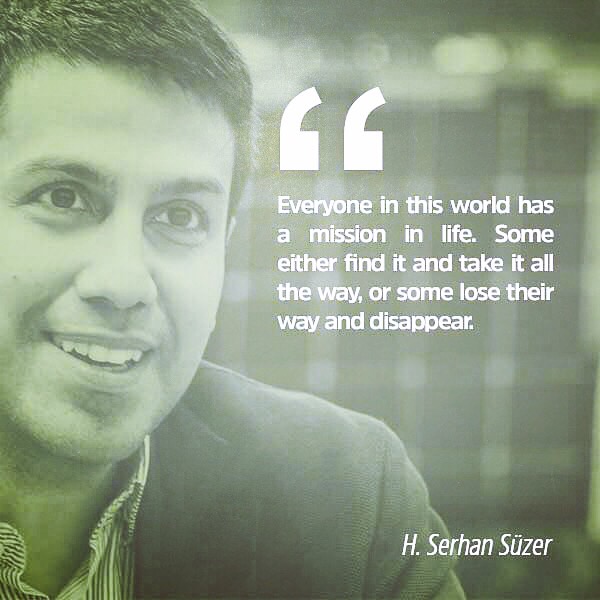Will the Aegean be able to chart a new course?
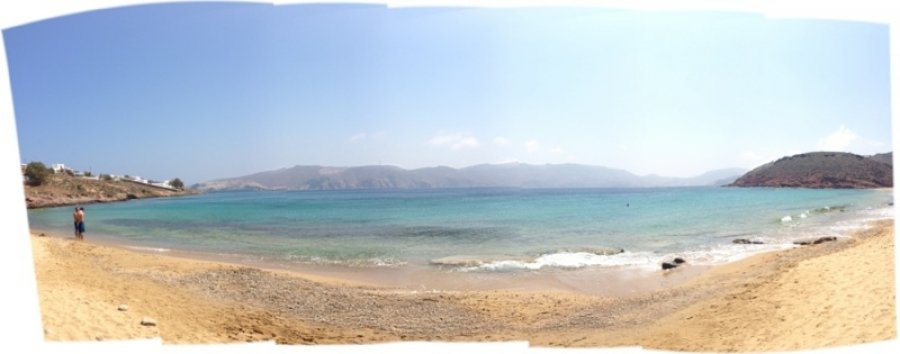
It has been an intense news cycle. Before the attack on Istanbul’s Atatürk Airport and the attempted coup, people were making frequent comparisons between the attractions of the Greek Islands and of Çeşme/Bodrum, in Turkey. The Aegean region hit the news again when the hotel the President was holidaying at was raided and some of the soldiers responsible fled to Greece. “Will they be extradited, or not?” was the question everyone was asking. This week I’d like to share some of my observations and experiences concerning the paradisiacal Aegean region and neighboring Greece.
There is a lot of grumbling about how expensive popular destinations such as Çeşme are, a subject Melis Alphan wrote about in her Hürriyet column under the headline: “Why should we pay through the nose in Alaçatı? Are we stupid?”:
http://sosyal.hurriyet.com.tr/yazar/melis-alphan_350/niye-alacatida-kaziklanalim-aptal-miyiz_40137284
I met Melis Alphan at an event organized by my mother and I agree with her completely on this subject, even if I find a lot of her columns to be disrespectful and overly aggressive.
Does anyone remember what Alaçatı was like in the ‘90s? Other than a few barely standing, old Greek houses, it was a place of ruins. While most people in İzmir were flocking to Çeşme for their holidays, the only interest in Alaçatı and its environs was for its public beach and surfing school. You rarely encountered anyone there from Istanbul.
Way back then, my grandfather told me that Alaçatı would one day compete with Bodrum as a tourism destination. He said similar things to others. His circle of friends and colleagues were of the opinion that my grandfather was taking a huge risk by building a hotel there and shouldn’t be taking such risks at such an advanced age.
The ugly Istanbulian and cunning merchants
My grandfather was proved right. The Alaçatı of today surpasses even his optimistic vision. On the other hand, not everything has turned up roses. An abundance of restaurants, boutique hotels and other enterprises tend to mushroom in any popular tourist destination. The law of supply and demand can lead to prices that spiral ever higher, particularly when you take into account that Turkey is one of those countries where opportunism is rampant and the subculture is exalted. The owners of venues and other tradespeople will jack up their prices without mercy. To an extent, I can understand why İzmir residents cry out, “Go home, 34” – the number on Istanbul license plates. But I think it’s only fair to point out that there are any number of desirable Istanbulians who have chosen to make places like Alaçatı their new homes. Not only do they take pains not to spoil the local fabric, they also contribute greatly to Alaçatı. They have as much right as anyone to move there. The real problem is the greedy merchants who prey on the holiday makers driven to the area in great numbers from Istanbul and other metropolitan areas by a herd mentality.
The Aegean region is a true paradise, all areas of it. It’s also blessed in terms of being the only place to have such a wide variety of renewable energy sources: solar, wind, geothermal, biogas, wave and tidal. We have done what we always do and begun to make parts of the region unhospitable and inhabitable. It’s not only us; the Greeks, too, have failed to appreciate the blessings of the region. We share a lot in common with the Greeks once you get past language and religion.
When I was studying in Canada I organized a number of events with my Greek friends. Whenever we wanted seafood we’d head for a Greek fish restaurant in Montreal. I was both the chairman of the Turkish Students Association and a member of the Greek Students Association. There were a number of Greeks in our association as well. One of my closest friends back then was Yannis, from Athens.
We maintained our friendship after graduation. In a twist of fate, Denizli was where I did my military service, and I would have been sent to the front lines if a war had broken out with Greece. After I finished my service I joked about this a lot with Yannis: “I’d have come visiting if you’d hassled me.” There is a huge difference between the environment and the military mindset when I did my service and what it is today. I find it outrageous that photos of roughed up and tortured commanders who participated in the coup and were opposed by their fellow Atatürkist and secular soldiers were provided to the media. Unfortunately, this has even become a joking matter on social media.
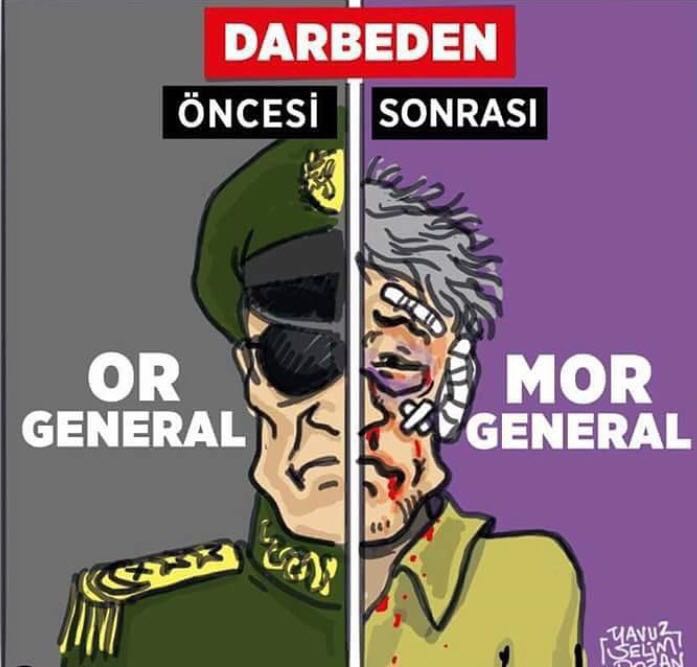
For those who can’t read Turkish, this is a before and after drawing of a general who goes from being a Full (Or) General to being a Purple (Mor) General, in just one example of the caricaturizing of tragic events.
Let’s put aside for a moment the fact that these coup plotters betrayed their country by obeying commands not from their superior officers but from an imam. A fair judicial system will find them guilty and give them the punishment they deserve. But I have this to say to those who arranged for their battered faces to appear in the media:
- You are eroding the respect Turks have for their military.
- You are inflaming the subconscious enmity between military officer and police officer.
- The prohibition of the torture of enemy soldiers, including those of your worst enemy, is a universal value.
- By displaying photos of a SAT commando with a black eye you have undermined the authority of our army’s most elite fighting force.
- Soldiers that are viewed as a superior force in psychological terms are thus able to resolve many a conflict without firing a single bullet. The public humiliation of soldiers participating in the coup will make it more difficult for the armed forces to battle terrorists.
It would have been helpful if you had concentrated in past decades on purging the military of these cancerous cells instead of later doing what I have outlined above.
Moments enjoyable and scary
Getting back to the main subject of this post, about 4 years ago Yannis, his wife of the time, Loli, and some other friends of ours had a wonderful holiday sailing by catamaran along the Greek islands. Naturally, Yannis took me not to the islands favored by tourists but to those preferred by Greeks. They included Andros, which he had been visiting since childhood and where he got married, as well as Tinos and Syros. Believe me when I say that the Greeks have kept the most beautiful islands to themselves and that they really know how to enjoy the Aegean.
Not all of my university memories of Greece are positive. I was a junior at McGill University when a notice about summer classes caught my eye. Intensive two-months classes were available in Brazil and Greece, and counted as credit toward a degree. I would have been happy to go to either country, but I was more curious about Greece, so I went there to study operations management and international trade. A group of professors and students from McGill University all caught a plane together from Montreal to Athens.
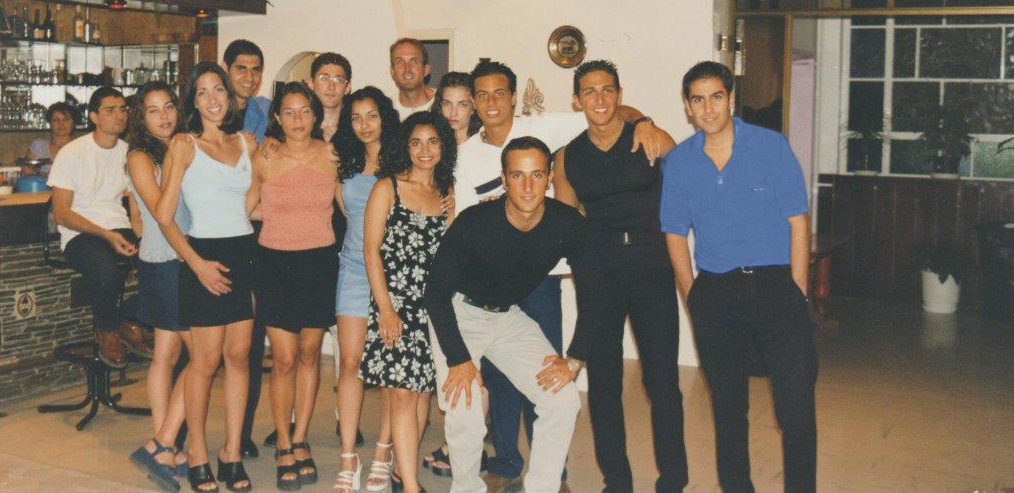
A photo with friends from McGill taken not long after we arrived in Athens from Montreal.
Summer school was going well when the first unpleasantness happened. One of them involved theft at our hotel (I’ll write more about this later). The other happened while a group of about 12 of us was sailing to Santorini island.
It was about 10 at night when we boarded the boat. We’d reserved places in the VIP section at the recommendation of our Greek friends. There were 4 guys and 8 girls, and we were joking around and talking about what we’d do on the island. The only people besides me who weren’t Canadian were from Singapore. Actually, because Canada is a land of immigrants, there were Canadians of Colombian, Lebanese, Palestinian and Indian descent. Our Greek friends hadn’t joined this outing.
Where are you from?
As it grew later at night, a Greek guy sitting at the next table had become drunk on half a bottle of tequila and began acting funny. Among those sitting closest to him were me and Amit, a Canadian friend of Indian origin. Amit, who is a bit of a prankster, began poking fun at the drunk Greek. Amit ramped up his jokes at the expense of the drunk Greek, who was about 10 or 15 years older than us, still a fairly young man. Everyone was laughing. The two of them were joking back and forth when the Greek guy asked me where I was from. This is the exchange we had:
- Where are you from?
- I’m Turkish.
- Are you kidding me?
- No, I’m serious.
A suddenly grave expression on his face, the Greek asked, “Are your friends Turkish too?” Amit was still enjoying himself. Perhaps it was due to the Turkish history lesson I’d given this roommate the previous day, but he immediately responded: “Yes, we’re all Turks.” I sensed trouble and muttered to myself, “This isn’t going to end well.”
The Greek kept guzzling tequila as he pointed to our Singaporean friends and said, “Are they Turks? They don’t look like it.” When Amit told him they were “Central Asian Turks,” the Greek grew red-faced and shouted at my roommate.”
“Did you know I’m from Cyprus? When you invaded our island you Turks killed my big brother!” All of the travelers listening to this exchange were startled by this sudden denunciation. Amit looked terrified.
The hands of the friend who snapped the photo above must have been shaking, but the image gives you a good idea of the scene.
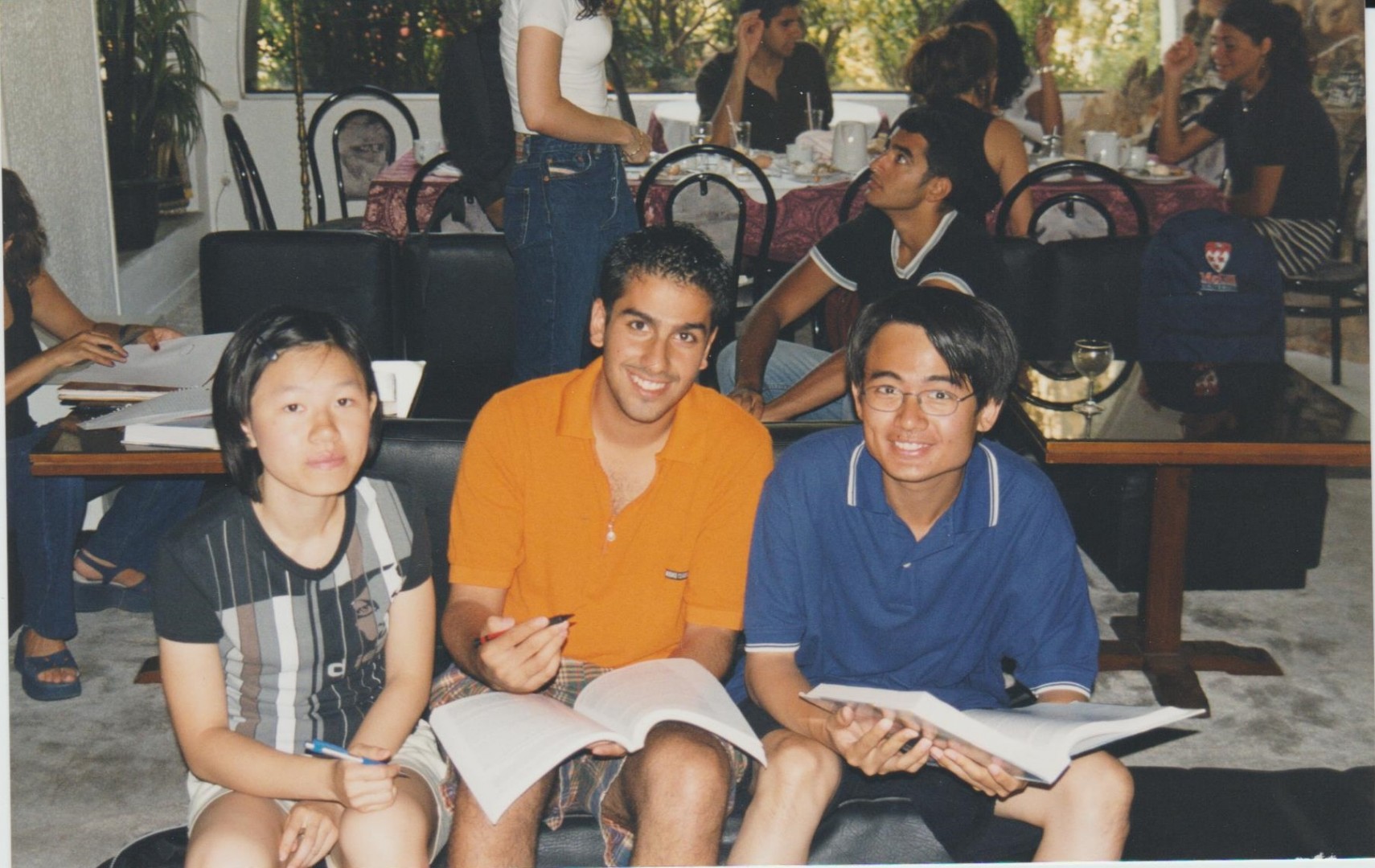
Studying in Athens with the Singaporeans introduced as Central Asians by my roommate.
In order to soothe him I jumped in and pointed out that everyone there had been born after the operation in Cyprus. I asked him to call down. This exchange ensued:
- Are you going to Santorini?
- Yes.
- There’s only one reason a bunch of Turks would go to a Greek island.
- (soothingly) We’re on holiday. We heard it was a romantic island with nice sunsets. Is that true?
- No, you Turks only go to an island to invade it.
- Like I said, we’re on holiday. You can less that fewer than half of us are men and we’re all wearing shorts and T-shirts. What’s all this about an invasion
- I know you people. You’re Turkish invaders.
- What your talking about happened in 1974. It’s now 1998. I understand that you were traumatized but believe me when I say we’re only here for a holiday.
Just when we thought it was over...
Talk in this vein went on and on. He kept talking to himself and shouting in Greek. We stopped by an island whose name I can’t remember about 2 hours later. Passengers boarded and disembarked. When the drunk Greek got off the boat we all heaved a sigh of relief. I turned to my roommate and warned him that his jokes could provoke people. I felt a bit responsible for what had happened. Amit couldn’t understand why. I told him I’d explain all about the Cyprus at another time and asked him to watch what he said when sensitive topics like that came up. He was just saying, “Well, how was I supposed to know that Greek guy would turn out to be a psychopath,” when the Greek returned to our compartment and sat back down in his seat. This time, though, something was different. He was holding a huge fishing knife. When he sat down at the table he slowly pulled it out of its sheath. As everyone was yelling and screaming, someone said, “Serhan, you’d better get out of here quick.”
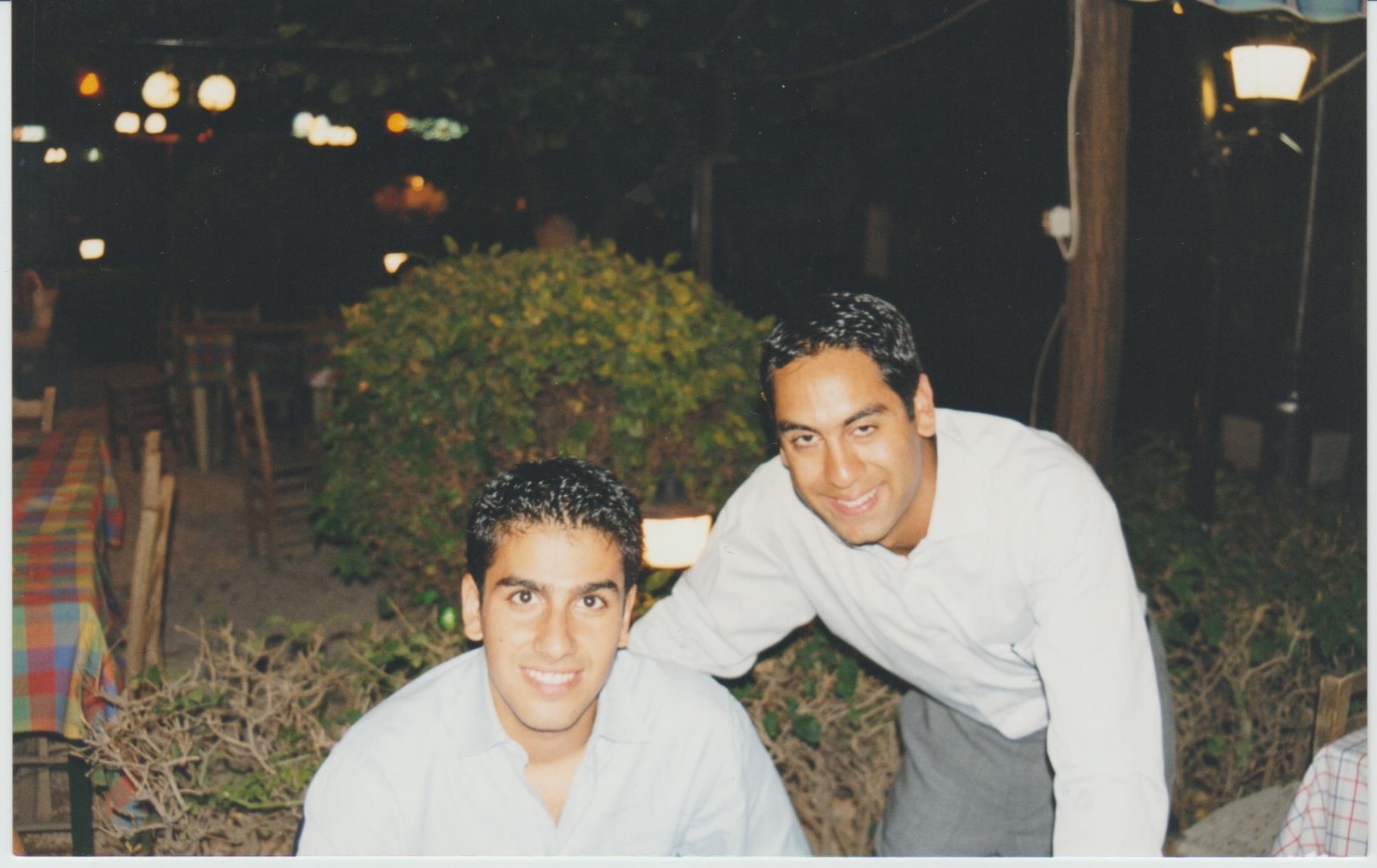
My brave-hearted roommate and me in Greece.
I made a snap decision. “Drunks are like barking dogs,” I said to myself. “If you run away, they’ll chase you. Don’t make any sudden moves.” I stayed there, right next to him. Brandishing the knife, he said, “Now tell me, why are you really going to Santorini?” He ran his finger over the edge of the knife as he moved it toward me. He turned around and said something in Greek. Everyone in the compartment watched us as they it was a scene in a play. Nobody made a peep except for my friends, who kept shouting at me to get out of there at once.
A critical moment at knife point!
For some reason, that’s just the way I am: When everyone panics I grow calmer. I watched the drunk Greek attentively, not losing my composure.
And then what happened? Let’s say there was a divine intervention.
He was thrusting his knife toward me when his elbow bumped the edge of the table and the knife fell from his hand.
He was bending over to pick up the knife when I instinctively rested my foot on it. I shoved him with the shoulder and took the knife.
Once he was unarmed the balance shifted. He just sat there, wordless.
“What do you think you’re doing?” I yelled. “What gives you the right to scare so many people?” Then I turned to my friends and told them to call down, that I had the knife. After that I called out to the other people in the compartment, asking where I could find security. They told me there wasn’t any, but that I could speak to the captain if I wanted. I found out where the captain was and went off to have a word with him.
The captain is tested by a crime
Here’s how my conversation with the captain went:
- Someone pulled a knife on us in the VIP compartment.
- Why would anyone do that?
- I don’t know. We were chatting away, but when I said I was Turkish he got off at the next island and came back with a fishing knife. Then he threatened me.
The captain’s response stunned me.
- Oh, that’s normal.
- Normal?! Well if I told you that I was travelling with 9 terrified Canadians and that this could turn into an international scandal would you still describe it as ‘normal’?”
I was furious, and my words had an immediate impact on the captain. “There’s an empty berth right over there,” he said. You and your friends can stay there if it would make you feel safer.” I went off to ask my friends, but what did I see back in the compartment? The drunk Greek was now sound asleep.
When I passed on the captain’s offer my friends said we should just stay where we were, that the drunk Greek was asleep and the danger over. Half an hour later, he started vomiting. After he’s thrown up a couple of time, fouling the area, some hefty Greeks, who hadn’t intervened when we were in trouble, came over and trundled him off by the legs and arms.
We reached our destination about an hour later in the dawn’s early light. We were overjoyed to have made it in one piece. It was time to enjoy the wonders of Santorini.
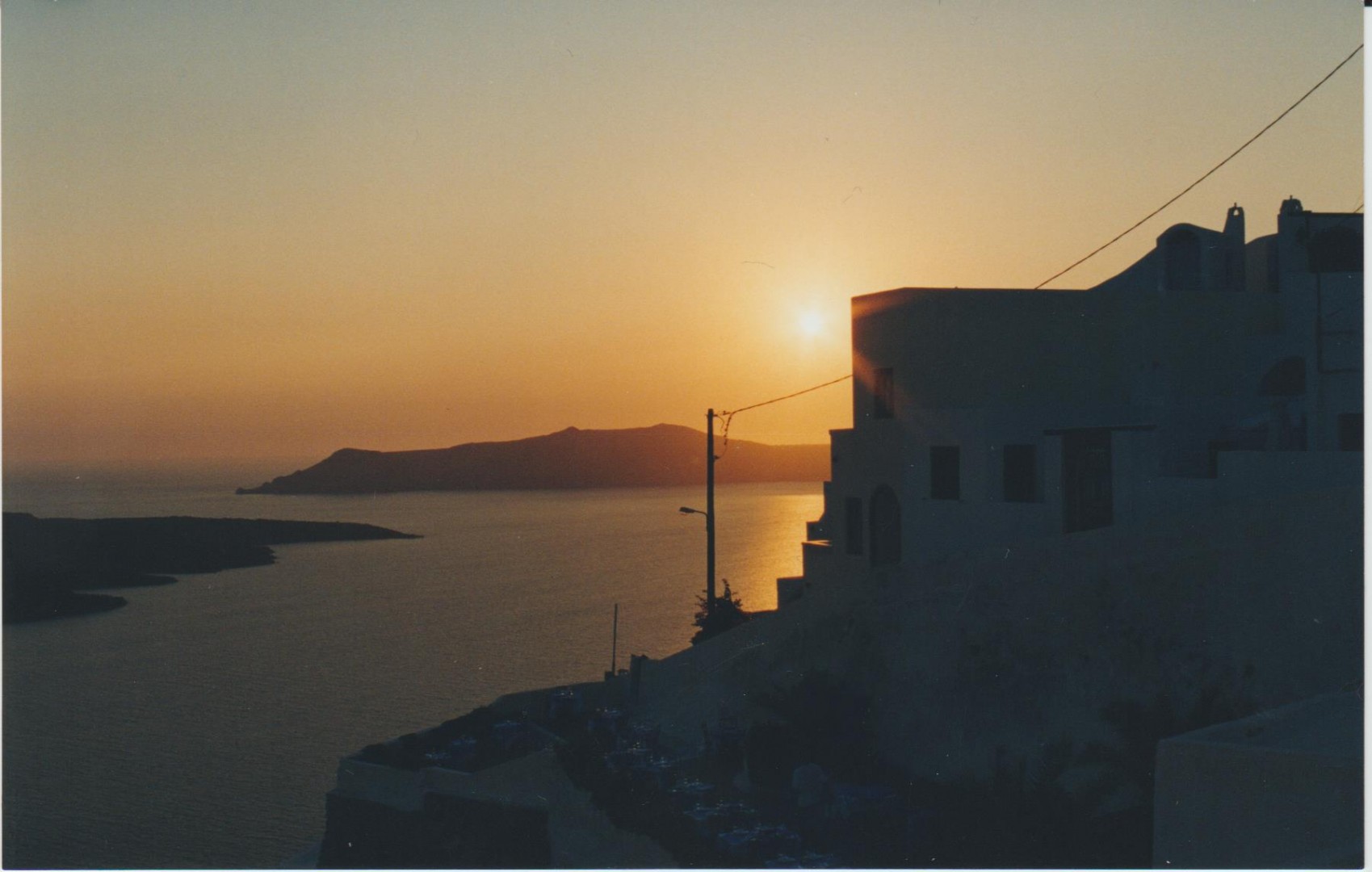
Rosy-fingered dawn in Santorini
The Turkish coffee test
Frankly, I didn’t really blame Greeks or Greek-Cypriots for that incident. But when I told my Greek and Greek-Cypriot friends about it they were, of course, upset on my behalf. In fact, some Greek friends said the drunk was from Cyprus, and therefore wasn’t a real Greek. As for my Greek-Cypriot friends, they said the unfortunate brainwashing still continued and that military conscripts were still taught that the best Turk is a dead Turk. I’m sharing all of this with you to give you a sense of what Greek-Turkish relations were like when I was a university student.
When I went to cafes back in those days I would do the Turkish coffee test. At Greek restaurants, if I asked for a Turkish coffee they would frown and say: “We don’t have Turkish coffee; we have Greek coffee.” But they would still bring me what I consider to be a Turkish coffee. It’s normal that in Greece the Greeks would call their coffee, which is similar to ours, as is so much of our shared culture, “Greek” coffee. In the same way, they call “dolma,” (stuffed vegetables) “dolmades,” and baklava, “Greek” baklava.
Let me give you another example by telling you what happened when I employed this same test in recent years. Their approach is completely different. When I ask for a Turkish coffee, they jokingly respond, “Did you know that the best Turkish coffee in the world is made in Greece?”
This illustrates, in its own small way, the serious change in relations and perceptions between our two countries. When I analyze why this has happened I can think of two things: the first is Turkish TV series, which seems crazy but is true. This series were wildly popular in Greece and made the Greeks feel more sympathetic toward the Turks. The second, and more important, reason is the economic crisis of the past few years. Struggling constantly with a bad economy and political instability, Greece is not the popular tourist destination it used to be. Except for the Turks, who now go there in greater numbers than ever.
In recent years, whenever I go to the mainland or the Greek islands, I am welcomed as a “Turkish brother” and with open arms. I suspect they too have long since realized that our two peoples are similar in many ways.
Go to any Greek island today and you’re bound to run into Turks. The ones who head to Mykonos for a stealthy getaway really make me laugh. Turks having an affair or wanting to get up to some kind of monkey tend to go to that island. What they don’t realize is that the place is crawling with fellow Turks and what happens in Mykonos never stays in Mykonos. When I last went there I counted all the Turks I spotted out of curiosity. Within 2 days I saw over 300 of them, and I knew a good 40 personally.
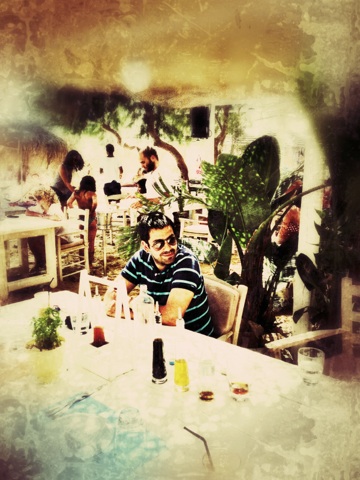
Sitting at a beach club in Mykonos

A beach in Mykonos
When Turks go overseas they always imagine that they are travelling incognito. They behave in ways they wouldn’t while in Turkey. I have a lot of examples of this. Once a couple of young women I knew from Istanbul started commenting in an obscene way about a painting of a nude male without realizing I was in earshot. It seemed odd to me that these women, who cultivated a reputation as serious art lovers in Istanbul, were acting completely differently as they took photos of the painting. I don’t think it’s at all cute when women pretend to be titillated by male nudes and their lewd comments were the last straw. I left the gallery without so much as a “good day.”
Basically, Turks are making a significant contribution to the Greek economy. That’s the main reason Greeks who used to purse their lips at us now greet us “brothers.” Us Mediterranean types really are all a little overemotional, I guess.
Neighborly relations...
Joking aside, there have always been Turks who liked Greeks and Greeks who liked Turks, despite the long years during which both sides encouraged their populations to view their Aegean neighbor with hostility and suspicion. The socioeconomic and political conditions of today have begun to hasten a widespread shift from enmity to friendship.
It wouldn’t be fair not to mention that the political seeds of this thawing were scattered by Turkish Foreign Minister İsmail Cem and his Greek counterpart, Yorgo Papandreou. For their contributions to a blossoming of friendlier relations, both men received the “Statesman of the Year Award” from the New York-based East-West Institute in 2000.
May İsmail Cem rest in peace.
Another interesting point is that the two brotherly peoples of the Aegean region, Turks and Greeks who share a similar climate, natural surroundings, food and character traits, will respond that they are not happy with life if asked. There are many reasons this is true, but I won’t go into them here.
Compare that to Costa Rica, whom I officially represent in Turkey. The people of that Central American nation rank at the top of the Happy Planet Index ranking: http://happyplanetindex.org/countries/costa-rica
What is it that makes the 4.7 million people of that country among the happiest in the world?
The answer is simple: its ‘Pura Vida’ culture. I suggest you read more to find out what I mean: http://serhansuzer.com/en/pura-vida-or-endowing-life-with-meaning
It’s people who make a real difference. The people of Costa Rica are happy because they were raised in a climate of Pura Vida. If the Aegean Region seems to have been cursed by fate, it is, again, because of the character of its people. Citizens on both sides of the Aegean have a lot to learn from Costa Rica. We need to focus on the kind of elementary education that helps to form character.
I advise you to have a look at the way Good4Trust encourages good character. At Good4Trust.org basic ethics begins with the Golden Rule: Treat others as you want them to treat you. We are trying to create a platform and in trust and good relations spread throughout the social and economic spheres. I’ll write in more detail about this organization at a later date.
Putting aside our relations with neighboring Greece, as citizens of the Republic of Turkey we all need to refocus on some basic and universal values: Love, respect, good will, contentment, honesty, human rights, industriousness, sustainability, merit, constant self-improvement…
Pura Vida!
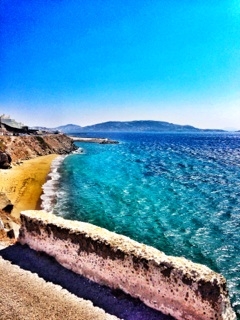
The Aegean Sea
Tag: anı


